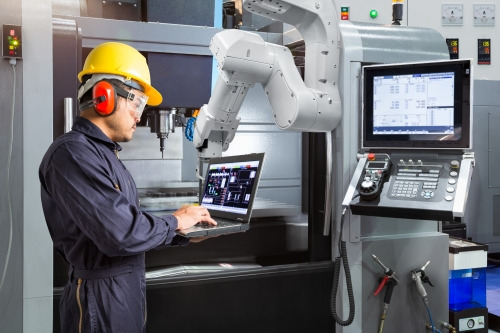
In the modern industrial landscape, the integration of technology into manufacturing processes is pivotal for operational efficiency and competitive advantage. Personal computers (PCs), once primarily office tools, have become integral components of industrial automation systems.
The Evolution of PCs in Industrial Automation
Industrial automation has significantly evolved over the last few decades, transitioning from simple mechanized tools to highly sophisticated software-driven systems. PCs have been at the heart of this transformation, offering powerful, versatile, and cost-effective solutions for controlling complex manufacturing processes. The adoption of PCs in industrial settings has been driven by their ability to perform a range of functions—from data collection and process control to system monitoring and operational management.
Key Applications of PCs in Industrial Automation
- Control Systems
PCs are often used as controllers in automated systems. They can be programmed to operate machinery, manage production lines, and monitor environmental conditions within industrial facilities. With advancements in hardware and software, industrial PCs (IPCs) or are designed to withstand harsh manufacturing environments, providing reliable and robust control solutions that are essential for maintaining continuous production processes.
- Data Acquisition and Management
One of the primary roles of PCs in industrial automation is collecting and managing data. IPCs are equipped with specialized software that can gather data from various sensors and machines on the factory floor. This data is crucial for real-time monitoring, performance analysis, and strategic planning. PCs help in organizing and storing vast amounts of data, making it accessible for analysis and decision-making.
- Human-Machine Interface (HMI)
PCs serve as the interface between human operators and machine systems, commonly known as Human-Machine Interface (HMI). They provide a user-friendly graphical interface that allows workers to interact with machines, input commands, and visualize process workflows. HMIs enhance the usability of automated systems and help operators manage and control complex operations more effectively.
- Networking and Communication
In today’s connected industrial environments, PCs play a vital role in networking and communication. They enable the integration of various automation systems within a plant and facilitate communication between different equipment and operational sectors. This connectivity is crucial for the implementation of the Industrial Internet of Things (IIoT), where machines, devices, and systems communicate and coordinate with each other seamlessly.
Benefits of Using PCs in Industrial Automation
Enhanced Efficiency and Productivity: By automating complex tasks and processes, PCs significantly enhance operational efficiency and productivity. They enable faster processing times, minimize human error, and allow for precise control over production, leading to higher output and better quality products.
Scalability and Flexibility: PCs offer scalable and flexible solutions to industrial automation. They can be easily upgraded or configured with different software to meet changing production demands or to integrate new technologies. This adaptability is essential in responding to market shifts and technological advancements.
Cost-Effectiveness: While the initial setup costs for PC-based automation systems can be high, they are generally more cost-effective in the long run compared to traditional automated systems. PCs reduce the need for manual labor, decrease operational costs, and improve the overall efficiency of manufacturing processes.
Improved Data Utilization: The ability of PCs to collect, store, and analyze data transforms raw data into actionable insights. This capability enhances decision-making and operational planning, leading to optimized performance and reduced waste.
Future Trends in PC Use in Industrial Automation
Edge Computing: As data generation in industrial environments grows exponentially, edge computing is becoming increasingly important. In this model, data processing is performed at the edge of the network, near the source of the data. PCs equipped with edge computing capabilities can process data locally, reducing latency and bandwidth use while enhancing the speed and efficiency of data-driven decisions.
AI and Machine Learning: The integration of artificial intelligence (AI) and machine learning algorithms into PCs is set to redefine their role in industrial automation. These technologies enable predictive maintenance, quality control, and even autonomous decision-making, paving the way for smarter and more responsive manufacturing systems.
Cybersecurity: As the role of PCs in industrial automation expands, so does the need for robust cybersecurity measures. Protecting sensitive data and ensuring the integrity of automated systems from cyber threats is becoming a critical concern that requires ongoing attention and innovative solutions.
Conclusion
The utilization of PCs in industrial automation has brought about profound changes in how industries operate and compete. As central components of automation systems, PCs enhance efficiency, enable innovation, and drive the digital transformation of manufacturing processes. Looking forward, the integration of advanced computational technologies and cybersecurity measures will further solidify the role of PCs in shaping the future of industrial automation, ensuring that they continue to offer valuable solutions in an increasingly complex and interconnected manufacturing environment.





